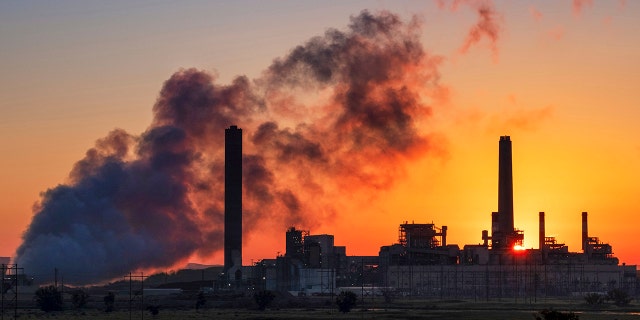In recent years, major banks have come under intense criticism for their business practices. We know them more today for misdeeds than merits. Their lapses have become lead stories in the mainstream media and ready-made content for C-SPAN hearings.
We’ve seen epic failures by First Republic, Signature Bank and Silicon Valley Bank; 19 state AGs alleging discrimination by Chase Bank against conservative and religious groups, and Wells Fargo paying millions to settle class action and CFPB claims for their fake account debacle.
These events have left deep fault lines in banks’ reputations, going from beneficent to black hat in recent years.

The future for many banks is inextricably tied to their policies and practices on climate, energy and the environment. And that portends more risk than reward. (AP Photo/J. David Ake, Fil)
Contrary to these popular notions, banks play a critical and consequential role in society. They facilitate the flow of needed funds, provide a reservoir of investment dollars, and foster economic progress, production and profit. From the mom-and-pop store down the street to the mega cap corporation downtown, business relies on banks and banks rely on business. They bring capital to commerce and anchor our economy. It is the way of the world.
In the pervasive context of climate change, environmental activists are working to penalize banks for doing their core business – lending money. Well-funded initiatives and worldwide campaigns have adroitly linked greenhouse gas to green eyeshades, and have cast banks, insurers and their investors as subjects of societal scorn.
The broad umbrella of “greenwashing” has allowed aggressive plaintiffs lawyers and activists to sue companies for fraud and deception in their environmental marketing claims.
In May 2022, the U.S. Securities and Exchange Commission (SEC) fined BNY Mellon Investment Advisor for misstatements on environmental disclosures.
And German prosecutors raided the offices of Deutsche Bank and its asset manager DWS as part of an investigation for environmental misstatements.
Globally, the cumulative number of climate change related cases has more than doubled since 2015, now totaling over 2,000. One quarter of these were filed in the last two years alone.
But tactics have been shifting in recent years. Class-action lawsuits, proxy battles, shareholder actions and intensive media campaigns are now quite common.
By following the money, they have embraced the international sanctions script that penalizes any direct or remote connection to fossil fuel. It is a well-worn playbook drawn from successful crusades against Big Pharma and tobacco. Demonizing banks is easy after all, because only economists and other bankers will rally to their defense.
In trying to shift the tenor from sustainable to sinister, activists miss the larger point. Financial institutions have embraced environmental sustainability in a big way just on their own terms, committing billions to reduce their credit exposure to oil and gas and comply with international conventions like the Paris accord.
Most major banks made commitments as part of the Net Zero Banking Alliance (NZBA), the flagship climate initiative intended to accelerate climate target setting and common practice under the Principles for Responsible Banking and the Race to Zero. Convened by the U.N. Environment Programme Finance Initiative, it is an industry-led effort that “brings together a global group of banks, currently representing over 40% of global banking assets, which are committed to aligning their lending and investment portfolios with net-zero emissions by 2050.”
Bank of America has committed $1 trillion by 2030 to accelerate the transition to a low-carbon, sustainable economy.
CLICK HERE TO GET THE OPINION NEWSLETTER
These are not insignificant sums of money and the commitment behind them should not be dismissed as meaningless or merely the cost of business.
In recent years, banks have engaged in redlining, discriminatory lending, fraud and other illegalities. When discovered, they have issued mea culpas and made amends for their actions, including targeted investments in disadvantaged communities, outsized philanthropy and remedial lending efforts. They have accepted corporate responsibility with chastened hands, and we should see fit to accept them warts and all.
Whatever moral transgressions banks have committed over the years – and there have been many – financing fossil fuels is not one of them.
CLICK HERE TO READ MORE FROM ADONIS HOFFMAN



